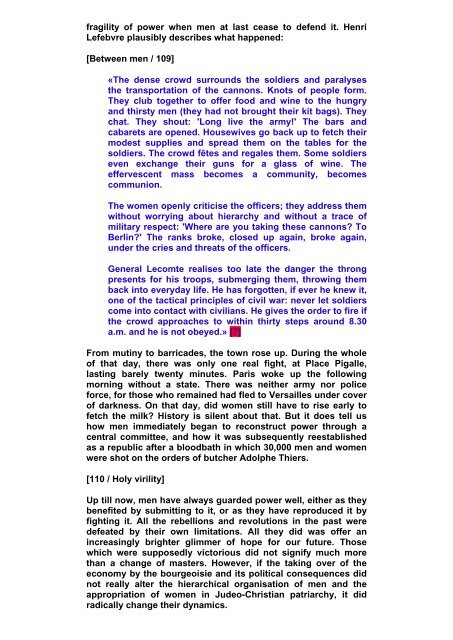emmanuel reynaud holy virility the social construction of masculinity
emmanuel reynaud holy virility the social construction of masculinity
emmanuel reynaud holy virility the social construction of masculinity
You also want an ePaper? Increase the reach of your titles
YUMPU automatically turns print PDFs into web optimized ePapers that Google loves.
fragility <strong>of</strong> power when men at last cease to defend it. Henri<br />
Lefebvre plausibly describes what happened:<br />
[Between men / 109]<br />
«The dense crowd surrounds <strong>the</strong> soldiers and paralyses<br />
<strong>the</strong> transportation <strong>of</strong> <strong>the</strong> cannons. Knots <strong>of</strong> people form.<br />
They club toge<strong>the</strong>r to <strong>of</strong>fer food and wine to <strong>the</strong> hungry<br />
and thirsty men (<strong>the</strong>y had not brought <strong>the</strong>ir kit bags). They<br />
chat. They shout: 'Long live <strong>the</strong> army!' The bars and<br />
cabarets are opened. Housewives go back up to fetch <strong>the</strong>ir<br />
modest supplies and spread <strong>the</strong>m on <strong>the</strong> tables for <strong>the</strong><br />
soldiers. The crowd fêtes and regales <strong>the</strong>m. Some soldiers<br />
even exchange <strong>the</strong>ir guns for a glass <strong>of</strong> wine. The<br />
effervescent mass becomes a community, becomes<br />
communion.<br />
The women openly criticise <strong>the</strong> <strong>of</strong>ficers; <strong>the</strong>y address <strong>the</strong>m<br />
without worrying about hierarchy and without a trace <strong>of</strong><br />
military respect: 'Where are you taking <strong>the</strong>se cannons? To<br />
Berlin?' The ranks broke, closed up again, broke again,<br />
under <strong>the</strong> cries and threats <strong>of</strong> <strong>the</strong> <strong>of</strong>ficers.<br />
General Lecomte realises too late <strong>the</strong> danger <strong>the</strong> throng<br />
presents for his troops, submerging <strong>the</strong>m, throwing <strong>the</strong>m<br />
back into everyday life. He has forgotten, if ever he knew it,<br />
one <strong>of</strong> <strong>the</strong> tactical principles <strong>of</strong> civil war: never let soldiers<br />
come into contact with civilians. He gives <strong>the</strong> order to fire if<br />
<strong>the</strong> crowd approaches to within thirty steps around 8.30<br />
a.m. and he is not obeyed.» [7]<br />
From mutiny to barricades, <strong>the</strong> town rose up. During <strong>the</strong> whole<br />
<strong>of</strong> that day, <strong>the</strong>re was only one real fight, at Place Pigalle,<br />
lasting barely twenty minutes. Paris woke up <strong>the</strong> following<br />
morning without a state. There was nei<strong>the</strong>r army nor police<br />
force, for those who remained had fled to Versailles under cover<br />
<strong>of</strong> darkness. On that day, did women still have to rise early to<br />
fetch <strong>the</strong> milk? History is silent about that. But it does tell us<br />
how men immediately began to reconstruct power through a<br />
central committee, and how it was subsequently reestablished<br />
as a republic after a bloodbath in which 30,000 men and women<br />
were shot on <strong>the</strong> orders <strong>of</strong> butcher Adolphe Thiers.<br />
[110 / Holy <strong>virility</strong>]<br />
Up till now, men have always guarded power well, ei<strong>the</strong>r as <strong>the</strong>y<br />
benefited by submitting to it, or as <strong>the</strong>y have reproduced it by<br />
fighting it. All <strong>the</strong> rebellions and revolutions in <strong>the</strong> past were<br />
defeated by <strong>the</strong>ir own limitations. All <strong>the</strong>y did was <strong>of</strong>fer an<br />
increasingly brighter glimmer <strong>of</strong> hope for our future. Those<br />
which were supposedly victorious did not signify much more<br />
than a change <strong>of</strong> masters. However, if <strong>the</strong> taking over <strong>of</strong> <strong>the</strong><br />
economy by <strong>the</strong> bourgeoisie and its political consequences did<br />
not really alter <strong>the</strong> hierarchical organisation <strong>of</strong> men and <strong>the</strong><br />
appropriation <strong>of</strong> women in Judeo-Christian patriarchy, it did<br />
radically change <strong>the</strong>ir dynamics.
















